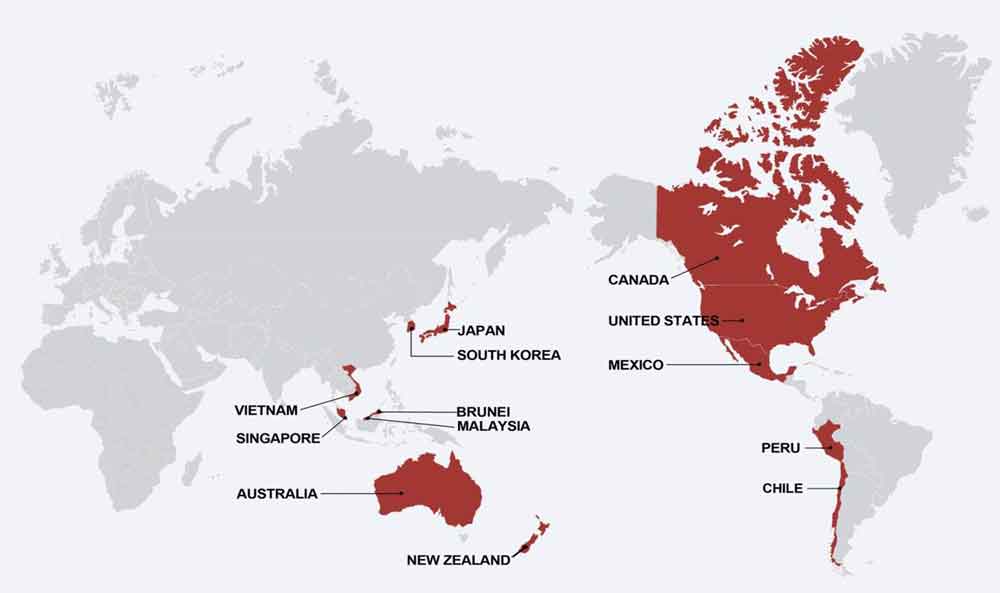As much as anyone, Oregonians recognize the incredible challenge posed by climate change and the need to address it head on. It’s one reason our Congressional delegation should reject the proposed Trans-Pacific Partnership, a 6,194-page pact that seeks to set rules governing approximately 40 percent of the global economy, yet fails to mention the term “climate” even once.
The United States entered the TPP negotiations in February 2008. For years afterwards, U.S. negotiators refused to tell the American people what they were proposing in our names, while simultaneously granting hundreds of corporate lobbyists special “cleared advisor” status that provided them access to the documents – including representatives of Chevron, the National Mining Association and America’s Natural Gas Alliance.
Only after the negotiations were concluded and substantive changes became all-but-impossible, was the TPP text finally released for public scrutiny late last year. As might be expected from a deal negotiated behind closed doors, this text puts corporate profits ahead of the needs of Oregon’s working families and the environment.
Sierra Club’s executive director Michael Brune calls the TPP’s failure to mention climate change “a dead giveaway that this isn’t a 21st-century trade deal.” 350.org – the group best known for committing civil disobedience to stop the Keystone XL pipeline – calls it “an act of climate denial.” Unfortunately, the TPP does far worse than just fail to act on climate. It stares the climate crisis in the face and asks, “How can we make it worse?”
Under the TPP, exports of fracked natural gas would be automatically deemed in the U.S. public interest, bypassing environmental and economic reviews, if going to any of the eleven current TPP countries throughout the Pacific Rim – including Japan, the world’s largest importer of natural gas. By increasing Liquefied Natural Gas (LNG) exports, the TPP is likely to increase energy costs for U.S. consumers and manufacturers, while simultaneously exposing Americans to the localized environmental consequences of increased fracking and the planet to further climate change pollution. This is in addition to new fossil fuel infrastructure to carry LNG to ports.
If that weren’t bad enough, the TPP’s controversial Investor-State Dispute Settlement (ISDS) system would enable transnational corporations to challenge environmental laws, regulations and even court decisions as “regulatory takings” in international tribunals that circumvent the U.S. judicial system and any other country’s domestic judicial system.
Under the World Trade Organization (WTO), portions of the Clean Air Act, Endangered Species Act and Marine Mammal Protection Act have already been successfully attacked under similar “trade” provisions that grant this type of power to foreign governments. The TPP would go beyond the WTO by giving individual corporations the power to initiate challenges.
Trade negotiators are quick to point out that the U.S. has never lost an ISDS case under current trade agreements, but the TPP would roughly double the number of firms with the ability to initiate ISDS challenges against the U.S. What’s more, corporations are already using the ISDS powers granted in a host of smaller free trade agreements and bilateral investment treaties. They are being used to attack clear air rules in Peru, mining laws in El Salvador, a provincial fracking moratorium in Canada and a court decision against the oil giant Chevron in Ecuador, among many other examples.

Trade rules have time and again been used to challenge the laws that keep us safe. We no longer get to know where our meat comes from because the country-of-origin labeling law was challenged under World Trade Organization rules. TransCanada’s current lawsuit against the U.S. under the North American Free Trade Agreement’s ISDS mechanism over the Keystone XL pipeline rejection asks for billions of taxpayer dollars in compensation. It is also a threat to the Healthy Climate legislation that will reduce the impacts of the climate crisis and create goodwill paying renewable energy jobs right here in Oregon.
Expanding this system throughout the Pacific Rim would only increase these challenges, gravely threatening governments’ ability to advance real climate solutions. In addition to the Healthy Climate legislation other environmental victories and work in Oregon could be put at risk. This ranges from the recent denial of a permit for an LNG facility in Coos County to the work being done in Portland to put a hold on new fossil fuel infrastructure projects.
EDITORIAL: Portland City Council should denounce TPP
If one needed any other evidence that the TPP fails the public on the environment, look no further than the fact that the TPP rolls back environmental enforcement provisions found in all U.S. trade agreements since the George W. Bush administration, requiring enforcement of only one out of the seven environmental treaties covered by Bush-era trade pacts.
Defenders of Wildlife President and CEO Jamie Rappaport Clark, who was once considered a likely TPP supporter, has said since the text’s release: “It is ridiculous that in 2015, 12 of the world’s nations would construct a trade deal of this magnitude and not even consider the effects of climate change. … Climate change is happening right now: Species are disappearing and extreme weather events like hurricanes, crippling drought and wildfires are becoming more prevalent across the world. Yet this trade agreement won’t even acknowledge it.”
Oregon’s congressional delegation should likewise recognize the obscene failure that is the TPP and vote against it to protect Oregon’s environment, policies, economy and public health.
M. Shannon has been the executive director of the Oregon Fair Trade Campaign since 2015. Contact him at 503-736-9777 or info@oregonfairtrade.org.


